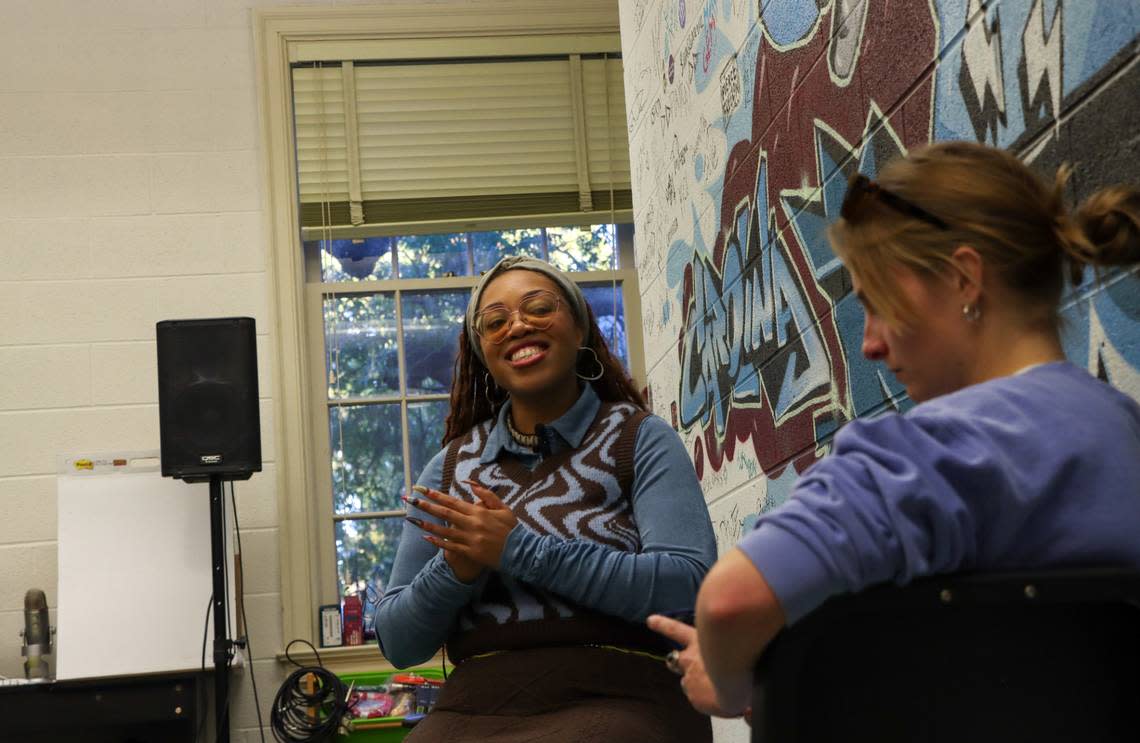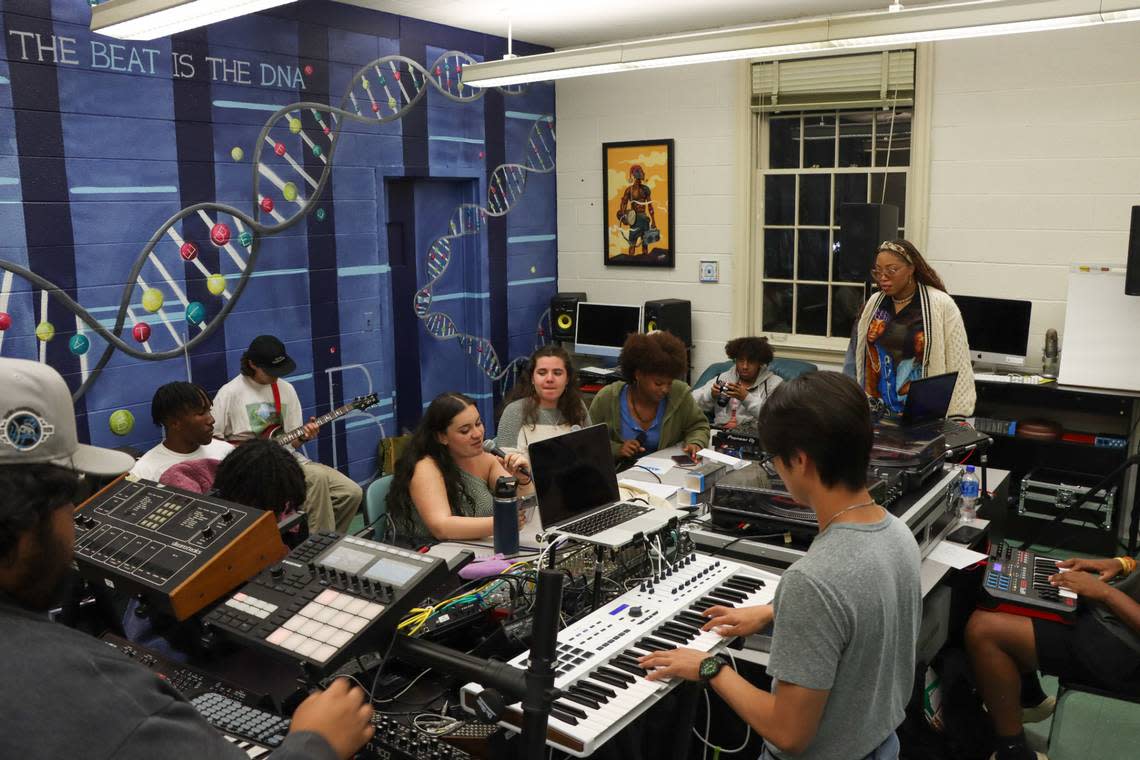As house music enjoys renaissance in NC, DJs vow to keep its roots at the forefront
It could be the skull-echoing Beyoncé song from the radio, or the college kids shutting down a frat spinning Taylor Swift remixes, or the music-festival-goers at the whim of a European DJ.
Regardless of how it’s heard, house music is seeping into the mainstream.
The house music genre was created to liberate: to liberate Black people cast aside from nightlife, particularly queer Black people who found solace in the re-creation of disco-beats for them to dance. Born from remains of the “kill disco movement” in the early ’80s, marginalized artists and disco-goers took to basements and warehouses of Chicago in search of musical freedom.
They found it in the creation of house music, known colloquially as “house.”
Just as disco, a dance genre for Black and queer people, shot to popularity with a movie targeted to white audiences — “Saturday Night Fever” — some say house is enduring the same fate. And that concerns some longtime house DJs.
“These white DJs aren’t telling the history that they know, if they know it, of the fact that the genre is created by Black and brown people,” said DJ Chaos, a Durham house DJ otherwise known as Ocean Kalunga Coaxum. “Not only are they being the faces and taking up space, but also not teaching.”
Most cities take house communities in stride. New York, Detroit, L.A. and Chicago are American meccas for music “collectives,” congregations of artists and producers in a genre. However, Durham isn’t far behind.
DJ Savon, or Stefan Parks, a Black trans-masculine DJ who moved to Durham from Detroit in 2018, plays beats a bit faster than the traditional 110 beats per minute. Parks draws on their Detroit roots for inspiration. In Detroit, the jazz and R&B culture reigned during the week, but the minute Friday night arrived, house music ran the streets and stations of the city.
“After 7 p.m., like you’re more likely you’re gonna hear some ghetto tech on the radio or whatnot,” Parks said. “Yeah definitely like house music, definitely a lot of like, R&B influences and whatnot just spewing out of a radio.”
Durham house scene grows
Parks noticed a bevy of new house DJs hit the Durham music scene seven years ago when they moved to the area, then again about a year ago.
Venues like the warehouse PS37 and the Pinhook, which is reminiscent of the Cat’s Cradle, are at home in Durham. The greater Triangle area also houses iconic electronic and house festivals like Hopscotch and J. Cole’s Dreamville.
PS37’s owner, Griffin Wade, said that more artists of the house and electronic genres have been booking out his warehouse venue, especially within the past year.
“House music and industrial spaces go hand in hand,” Wade said. “But popularity has exploded. The majority of our programming is house gigs.”
Though just down the road, Chapel Hill is far more scant in a house scene. As far as turntables go, most house fans would find familiar synth beats in the basements of fraternities, or up the stairs at the newest Still Life branch on Franklin Street.
Coaxum, or DJ Chaos, is a Black-trans queer producer in Durham. She began producing afrofuturist punk music just a year ago. For her, the process and the performance are entirely about liberation.
“Without music, I would not be alive — music and dance are the things that have always been my way of regulating my body, regulating my spirit and also being able to process trauma,” Coaxum said. “That’s first and foremost but also, the music I make is very intentional and very much used as a tool.”
She uses the word “sickening” — her way of saying great — over and over to describe Durham’s tight-knit house community.
“The community is very sickening, loving,” Coaxum said. “You’re not ever going to hear the same sounds twice. This is the area where so many people are moving to, so you’re also seeing this cultural exchange happening in this mess.”
Coaxum began producing last year, but has been part of the artistic LGBTQ and BIPOC Durham community for much longer. After being noticed by a fellow Durham artist while doing drag, Coaxum fell into house production.
But music was never unfamiliar to her. Coaxum’s family has roots in the distinctive arts culture of the Gullah Geechee nation, the slaves taken to the Sea Island, South Carolina, plantations from West Africa. They encouraged her musical endeavors, from her dance practice in high school to her exploration of the arts.
The shock of moving from the New York area to the South at 11 years old was beyond geographic, as she was met with casual racism attending North Carolina public schools.
But Coaxum harnesses her battles against marginalization and uses them to influence her songwriting and showcasing. Her music can best be described as chest-pounding. That caught the attention of a Miami-based indie label called Never Normal Records about a year ago.

North Carolina sounds
Coaxum works closely with the mother of the label, Maya Shipman, a UNC-Chapel Hill professor who performs as Suzi Analogue.
Analogue is a producer, artist and member of the Recording Academy, which awards Grammys in an array of categories, and produces under her original label, Never Normal Records. Analogue has label members and listeners around the world, but it was her priority to have members in North Carolina.
“There’s so many important cultural stories and trajectories that are in North Carolina, even though it can lack some of the industry that could push and bolster it over the top,” she said.
Analogue grew up listening to the beats and bumps of house music every weekend. Every experience for her, even the live, lengthy broadcasts, particularly when produced by marginalized groups, was focused on listener and audience interaction.
“That’s when you’re going to sometimes get some of the most cutting edge music, because people are feeling a lot of things when you have a marginalized identity,” Analogue said. “The beats are going to go hard and it’s going to liberate and uplift people around the community.”
Since moving to the Triangle in 2022, Analogue draws on deep North Carolina histories to both produce and teach. In her Beat-Making Lab class, Analogue walks students through artist and song origins, how they appear in new songs, and the integration of samples into songs.
Like understanding that the “Disco King Mario,” an infamous Bronx-based DJ and one of the first fusers of hip-hop and disco in the early ’70s, was also an Edenton native.

Influencing a younger generation
Occasionally DJs who hope to mix in a little history frequent venues to play house, but it’s difficult when someone knows their younger audience craves genres a bit more pop-like.
Tesnim Arebawel, known as DJ Teza, is a 21-year-old aspiring club spinner and UNC-CH senior. His love of DJing was born at a music festival and nurtured at his fraternity. Now that he’s three years into his practice, Arebawel wants to break away from the label “frat DJ,” as he considers what his DJing future looks like.
“That is also what makes it so you don’t have to know about the history, or know about older songs, you can just pick it up, watch a couple of YouTube videos and not really have to care about the history,” Arebawel said. “Like at all.”
Only recently, after watching the documentary “Pump up the Volume,” which tells the evolution of house music, did Arebawel learn about the genre’s history.
Donovan Mooney is a senior studying communications and minoring in music. At least once a week, he raps his writing over other student’s beats as part of Analogue’s beat-making class.
Though he admits pop-artist Drake’s recently popular house album wasn’t too shabby, he was raised on gospel and R&B, and stands by hip-hop as his favorite genre.
“I think like, the peak of hip-hop was in 2010s and with that advent of the 2020s, and especially like, short-form video media, like TikTok,” Mooney said. “I think this is bad for music in general, and it’s like it’s not driven by a single genre anymore, it’s just driven by trends.”
A research study from MRC Data, conducted for TikTok in 2021, explains: “67% of the app’s users are more likely to seek out songs on music-streaming services after hearing them on TikTok.”
Social media, and its heavy use by those younger than 30 – particularly short videos with viewership-enticing dance music – has spurred the age of remixes and do-it-yourself-deejaying.
Move to mainstream divides artists
Fans who make it beyond 10-second videos might recognize house is defined by 40 years of musical war.
And organizations like the Recording Academy are stepping up to give recognition to artists and patrons of classic house music.
In 2023, after Beyoncé swept the dance/electronic category at the Grammys, the big-name win brought controversial attention from both the Academy and critics in the house community.
“Is it fair to have all this R&B and all of these other sounds pushed into your category, and then someone take that whole category away from you,” Analogue said. “We just want to make it a little more equitable.”
The Academy has now added a separate dance pop category from dance/electronic to keep big-name artists jumping on the house trend from swiping underdog wins from smaller artists just trying to recreate some history.
Matt Colon, the former chairman of the Recording Academy, told Billboard that the move was “the biggest victory for dance music at the Grammys in almost 20 years, since the addition of the dance album category in 2005.”
Analogue pauses, and remembers gleefully she needs to cast her vote for the new category at the Grammys in January.
In a way, it was Beyoncé’s “Renaissance” album that might have struck a larger chord in the country’s house music roots revival.
“I can’t find anywhere to go listen to techno like this in Raleigh, so it’s just like specifically here in Durham, like, there is a heart for electronic music,” Parks said.
In the five years that Parks has deejayed, they’ve seen changes in their audiences. They’re no longer only LGBTQ or Black individuals, but Latino and white of all ages and backgrounds.
“It almost feels like a little renaissance to us,” Parks said. “No one else knows, but it’s kind of cool to just witness this on this backend. It’s like witnessing something before, you know, the calm before the storm.”
UNC Media Hub is a collection of students in the Hussman School of Journalism and Media who create multimedia packages covering stories from around North Carolina.
